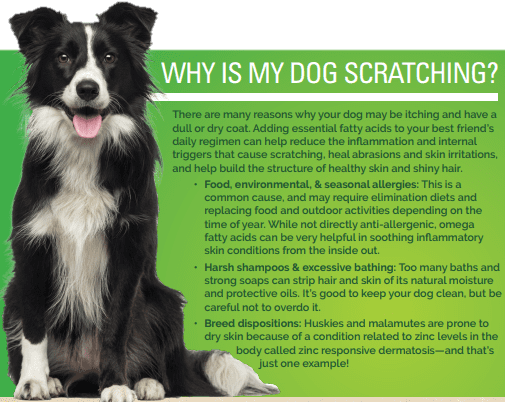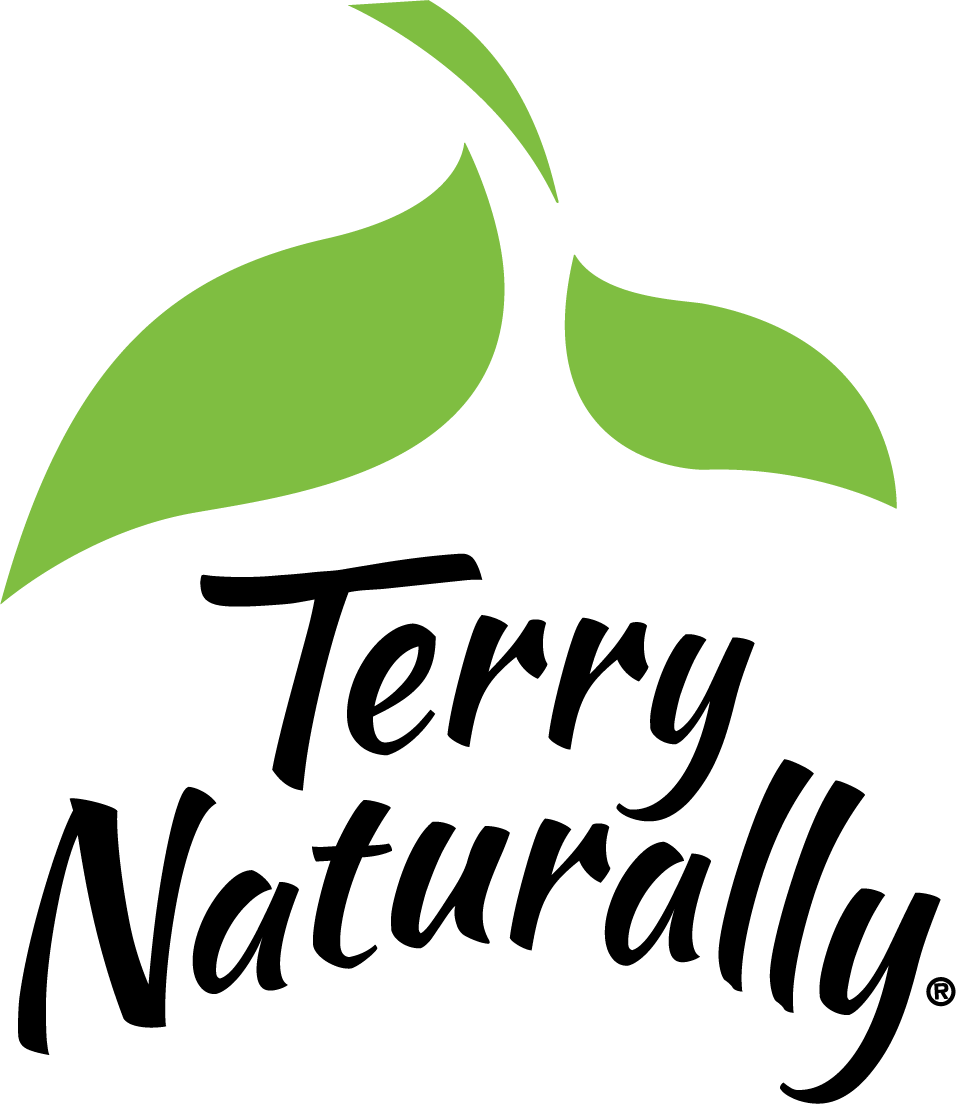One of the most visible ways of gauging your dog’s health is by the condition and appearance of their skin and coat. And of course, your best friend will definitely let you know when they feel discomfort—they scratch a lot.
It’s important to address this right away. Excessive scratching from atopic dermatitis, for example, can cause soreness, more itching, increased inflammation, and possibly serious bacterial infections.
While there are many reasons your dog may be uncomfortable, and there are a multitude of topical approaches you can try, I think it’s important to consider your dog’s nutrient intake first. Essential fatty acids are an excellent place to start.
Essential fatty acids (EFAs) are an important part of everyone’s diet. However, omega-3 fatty acids are not produced by our bodies canine or human. They must come through diet or supplementation.
Nourishing Healthy Skin and Coats from the Inside
So how do omega fatty acids work?
First, omega fatty acids help build epidermal layers—strong, healthy skin that stays pliable, retains proper moisture levels (and doesn’t dry out or get flaky), heals easily from minor abrasions, and resists bacterial infection. It also helps build a shiny and lustrous coat by providing the shafts of hair with much needed nutrients.
Secondly, omega fatty acids also reduce inflammation. Inflammatory damage doesn’t just affect joints, it damages tissues throughout the body, including the integrity of the skin and epidermal barrier and the structure of hair. So while they are improving your dog’s skin and coat, they may also help your dog scratch less and be less likely to set off a spiral of itching, scratching, skin damage, more itching, and so on.
And of course, aside from nourishing the skin and coat of your best friend, omega fatty acids work wonders for cardiovascular health and cognitive strength as well.
Studies Show Great Benefits
A variety of essential fatty acids have shown incredible benefits for skin conditions in dogs. For example, a two-month study of canines with atopic dermatitis found that a regimen of an omega-3/omega-6 combination improved the lipid strata and structural layers of the skin.
Another study found that adding a blend of omega-3 and omega-6 enhanced food stopped severe itching (pruritus) due to atopic dermatitis in as little as seven days.
Other work has found that over a 12-week period, increasing healthy dietary fats resulted in, as the researchers phrased it, “a significant improvement in hair coat glossiness and softness.”
There have also been studies on specific ingredients that are rich sources of fatty acids as well. Flax and sunflower seed oils, for example, improved hair and skin in one month. Blood tests showed that serum fatty acid increased in dogs treated with flax seed oil supplementation—but surprisingly not with sunflower seed oil, even though the outward conditions were better in both groups.
Research with pumpkin seed oil revealed that this nutrient-rich source of linoleic acid, sterols, and tocopherols improved skin wound healing.
One of the reasons that pumpkin seed oil is so effective for healthy skin is because it activates a naturally-occurring factor in the body called nuclear factor erythroid 2 related factor 2 (Nrf2). Nrf2 has antioxidant, anti-inflammatory, and cell protective actions throughout the body. Activating Nrf2 can fight aging, preserve cognitive abilities, and reduce inflammation. In this study, pumpkin seed oil activated Nrf2, converting the potentially damaging actions of ultraviolet (UV) exposure into new and healthy keratinocytes—the cells that make up the outermost layer of the skin. It transformed what would normally be a bad reaction from UV radiation to a good and healing outcome.
Provide Your Best Friend with Essential Fatty Acids Every Day
Sensitive skin, irritation and redness, and a dry, dull coat are often surface indicators of a deeper problem. Much of the time, these outward signs can be a result of nutritional imbalances that you can easily remedy for your best friend.
That’s why I recommend a full spectrum of essential fatty acids that you can add to their diet every day. Always remember that freshness with essential fatty acids is also incredibly important. Rancid oils only cause further oxidative damage and inflammation, so it’s critical that your dog’s supplement of full spectrum omega-3, -6, and 9 oils is fresh, stable, and consumed daily.
You will start to notice an improvement in your dog’s appearance, and they will notice a big difference in how comfortable and healthy they feel. And I’m sure you’ll both be much happier as a result!

What do these numbers mean?
Deciphering Omega-3, Omega-6, & Omega-9
Omega fatty acids are designated by numbers that refer to their molecular structure. For example, an omega-3 fatty acid has a double
bond three atoms away from its terminal methyl group. Omega-6 fatty acids and omega-9 fatty acids follow similar patterns, with a double bond between the sixth and seventh carbon atom, or at the ninth carbon atom from the terminal point, respectively.
The description of omega-3 fatty acids may sound abstract, but in reality it is a very flexible, beneficial fat. This attribute helps make skin cells and hair shafts stronger, healthier, more resilient, and improves appearance.
In plant oils, the predominant omega-3 fatty acid is alpha-linolenic acid (ALA). From animal sources like fish, you’ll get eicosapentaenoic acid (EPA) and docosahexaenoic acid (DHA) as primary omega-3s.
Many human diets, (and I suspect most canine diets, too) are often tilted too far in the direction of omega-6 fatty acid, also called linoleic acid. Too much omega-6 can be inflammatory, and is likely the cause of many illnesses that could otherwise be avoided. However, omega-6 does have its place – in the right proportion. Like omega-3s, it also builds strength and structure of cell membranes.
Omega-9 fatty acids are monounsaturated fats that can act as anti-inflammatory agents and may be especially helpful for reducing skin irritation and topical allergic reactions.
Ultimately, a full spectrum of these essential fatty acids – in the correct ratio – are ideal for healthier skin and coat of your best friend.
Here is the liquid formula I suggest:
Cod (Gadus morhua) Liver Oil, Organic Flax (Linum usitatissimum) Seed Oil, Organic Pumpkin (Cucurbita pepo) Seed Oil, Organic Sesame (Sesamum indicum) Seed Oil, Organic Sunflower (Helianthus annuus) Seed Oil.
